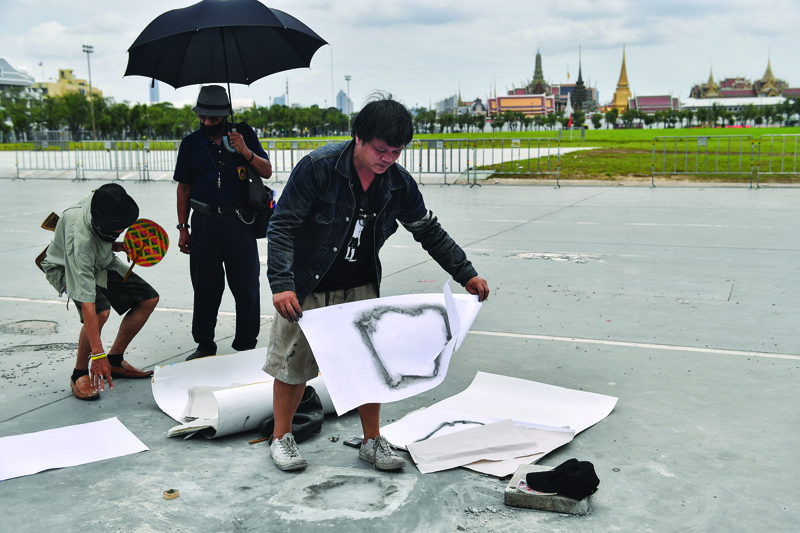
BANGKOK: A plaque installed on the weekend by activists in Bangkok declaring Thailand "belongs to the people" had been removed yesterday, after a show of force by pro-democracy protesters calling for the royal family to stay out of the country's politics. The kingdom has seen near-daily protests for the past two months led by students demanding the resignation of Prime Minister Prayut Chan-O-Cha, a former army chief who masterminded the 2014 coup.
Some 30,000 demonstrators rallied Saturday close to Bangkok's Grand Palace -- where organisers took a stronger line on monarchical reform -- before installing a commemorative "People's Plaque" the morning after. But by yesterday, the plaque had vanished. "I heard it's missing and we're investigating the case," Bangkok's deputy police chief Piya Tawichai told AFP.
AFP journalists confirmed the removal. The almost-immediate removal of the plaque "reflects the fact that arch-royalists are not only incensed by demands for monarchical reform but are not going to put up with any symbols that even reflect opposition to the palace," said Paul Chambers of Naresuan University. The plaque, placed in the historic Sanam Luang field, had read: "The people have expressed the intention that this country belongs to the people, and not the king."
At its installation during Saturday's protest, prominent activist Parit Chiwarak shouted "Down with feudalism, long live the people," as the crowd cheered. The new medallion referenced the original brass one embedded for decades in the grounds of Bangkok's Royal Plaza. It commemorated the end of royal absolutism in 1932 after a revolution that transitioned the kingdom into a constitutional monarchy. But it mysteriously disappeared in 2017 -- after King Maha Vajiralongkorn took power following the death of his father -- replaced with one bearing a reminder for Thais to remain loyal to the "nation, religion, king".
Some factions within the movement -- including the organisers of the weekend demonstrations -- have also called for frank discussions on the monarchy, a once-taboo topic due to tough royal defamation laws. Activists say the missing plaque is emblematic of a wider whitewashing of Thai political history. Palace officials did not immediately respond to requests for comment.
Organisers had initially planned to march to Government House, but a last-minute change of plans saw protesters move to the Privy Council's office -- opposite the Grand Palace -- to submit a list of demands addressed to the king. The highly influential board of royal advisors wields significant influence in Thailand. Dozens of officers stood guard, alongside water cannon trucks in front of the palace.
People have woken up
The largely leaderless youth-organised movement, partly inspired by Hong Kong's pro-democracy protests, is calling for Prayut's government to be dissolved, a rewrite of the 2017 military-scripted constitution, and for authorities to stop "harassing" political opponents. Some factions within the movement have also called for greater accounting of the palace's finances, the abolition of royal defamation laws and a call for the king to remain outside of politics.
King Maha Vajiralongkorn sits at the apex of Thai power, bolstered by a powerful military and conservative establishment. He spends long periods in Europe, his absence from Thailand raising ire on social media in recent months as the economy tumbled because of the pandemic. The new Sanam Luang plaque will be regarded "as an immediate challenge", said analyst Paul Chambers, warning that the growing acrimony could lead to "state violence against protesters".
Prayut has said Thailand would be "engulfed in flames" if the students push too hard, though he vowed "softer measures" against the weekend's protesters. Since 1932, the military has staged more than a dozen coups following bouts of violent protests -- which arch-royalist generals have claimed in the past was necessary to defend the king. The recent wave of demonstrations has so far been peaceful. But authorities have arrested more than two dozen activists, charging them with sedition before releasing them on bail.
Protesters have called for another rally Thursday outside parliament as MPs debate potential constitutional changes. But opposition MP Rangsiman Rome was not sure if reforms of the monarchy would be on the table. "MPs are afraid… They're worried they might get some problems." A general strike has also been called for October 14. "People have woken up," student Napassorn Saengduean, 20, triumphantly told AFP as Sunday's rally dispersed. "I will keep coming back until I die." - AFP










